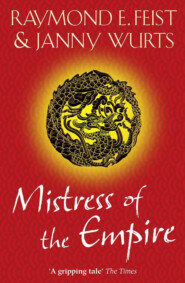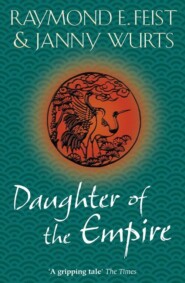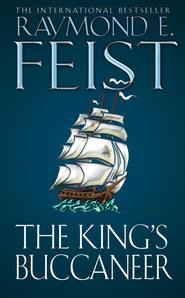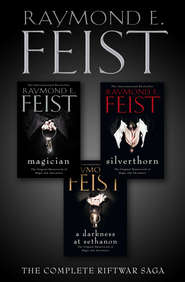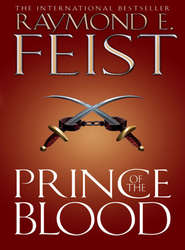По всем вопросам обращайтесь на: info@litportal.ru
(©) 2003-2025.
✖
The Complete Legends of the Riftwar Trilogy: Honoured Enemy, Murder in Lamut, Jimmy the Hand
Автор
Год написания книги
2018
Настройки чтения
Размер шрифта
Высота строк
Поля
‘The liver and heart,’ Asayaga said, offering one of the curled up pieces of flesh to Dennis.
Dennis reluctantly took one and popped it into his mouth. In spite of his initial reaction he had to admit it tasted half-way good. He nodded.
A number of Kingdom troops, drawn by curiosity, were gathered into the crowd, several of them munching on bones and strings of meat, then turning back to their comrades, laughing and challenging them to join in.
‘Laughter also forestalls the killing,’ Asayaga said. ‘From what I heard and what I sense, there will be fighting tomorrow. We must fight together, Hartraft: eating and drinking tonight will make that easier come dawn.’
Dennis found that he had to agree. He forced himself to take the sack of aureg and to drink. This time it didn’t seem quite so bad, at least if he swallowed quickly, and though it wasn’t brandy from Darkmoor, it did indeed bring a touch of warmth to his insides.
As they passed the sac back and forth, watching their men feast, Dennis suddenly felt a strange sadness. Stripped down as they were, laughing, gorging themselves, the moment struck him as tragic. He had long ago come to accept life as an unrelenting tragedy but somehow, this night it seemed more poignant than usual.
He was by no means falling into the maudlin thoughts that poets and ballad-makers spoke of – how enemies might share a moment of friendship. What he felt was sentimental foolishness: the war had done far too much to him. Looking over at Asayaga he knew he could kill him without hesitation and sensed that Asayaga felt the same.
And yet, if it wasn’t for the dread closing in – the memory of what was occurring at this very moment but sixty miles to the south – he felt as if he could almost enjoy this evening. Perhaps we are fey, he thought. We know we’re doomed and have lived with terror these last three days and the break is a final grasping at a moment of laughter.
He had shared many a campfire with strangers, and got drunk around many a fire as well, pledging friendships and then, come dawn, they had all gone their separate ways. He knew enough to place little weight on such things. Perhaps that was the reason for the melancholy. Or perhaps it was the sudden loneliness he felt with Jurgen not being here.
What would Jurgen say of this moment? He most likely would have smiled and stepped forward to share the juice, then clapped Asayaga on the shoulder.
But they had killed Jurgen, the same way they had killed my father … and her.
‘Something troubling you?’
He looked down at Asayaga who was offering the sac of aureg and actually smiling.
‘No more,’ he said coldly.
Asayaga nodded, and in an instant his features were again the blank expressionless gaze of a Tsurani officer.
‘Divide up your men. Once we are done eating, two sleep while one stands watch. I want the fires banked down. We’ll keep them going but not the inferno we have now. Once past midnight, I want half on watch. We’ll break camp the moment there is the first trace of dawn.’
‘I take that as a suggestion only, Hartraft,’ Asayaga said coldly.
‘Take it any way you want, Tsurani.’
‘You are a hard man.’
‘That is how I stay alive, Tsurani.’
‘Is it?’
‘What do you mean?’
Asayaga shook his head and tucked the sac of aureg back under his tunic. ‘Two sleep, one on watch till midnight. Then half watch while the other half sleep. We break at first light. I’ll stand the first watch, Hartraft: you sleep.’
Asayaga stalked away, joining the circle around the fire and within seconds he started to laugh again, accepting a handful of steaming meat, but as he laughed he looked back at Dennis, eyes watchful and intent.
Dennis cursed softly. Picking up a stick, he speared a piece of venison out of the fire and walked into the woods to be alone.
• Chapter Nine • (#ulink_6a21d2ba-e922-5499-8202-0220041f855d)
Chances (#ulink_6a21d2ba-e922-5499-8202-0220041f855d)
THE RISING MOOON WAS BLOOD-RED.
Tinuva, all senses as taut as a bow-string took the colour of the large moon to be an omen, a warning from his ancestors, as it climbed over the forest behind him.
There was nothing direct to tell him of the danger, no sound of snow crunching, no scent on the frigid wind: the warning was deeper, coming from the core of what he was. He knew that humans, at times, could vaguely touch that sense, the feeling of being watched, or better yet the bond that twin brothers had, knowing what the other was thinking and feeling.
He felt hatred, an ancient hatred that stretched across centuries. He knew it as intimately as the presence of beloved friends, the memory of the sacred groves, the sight of the eternal heavens at night.
Bovai was close, very close. Stalking, reaching outward, trying to touch into his heart, and above all else calling to him.
He felt as if they were two serpents who had sighted each other at last, unblinking, staring, each trying to seek the first advantage before the lightning strike.
He was torn: the call of Bovai was like a deep longing, strangely almost like the whisper of a lover’s voice that beckoned, seeking the release of passion, except that this was the passion of death.
Tinuva turned his head, gaze fixed, not seeing with his eyes, but with his soul, and the colour of the world shifted. It was no longer filled with the dark shadows of night, but instead was changing to a pale glimmer of light which settled over the frozen woods, sparkling and flashing. All was bathed in a lovely blue sheen and there were no shadows, though to a mortal standing next to him the night would seem unchanged.
He could see Bovai, advancing alone, moving without stealth, into the open, but still distant far beyond bowshot range. He knew that walk well: disdainful, bold with arrogance, confident in his power. There was more familiar about the moredhel chieftain, but he chose to not dwell on those familiar qualities. He knew the resemblances were the heart of the blood debt between them.
Each was aware of the other’s presence. This was not like Kavala, who, preoccupied with other thoughts had only yesterday ridden to his well deserved doom. No, Bovai would never be so foolish, even if he were two hundred miles away, in the safety of his own dwelling, still he was always alert, always watching, for he knew that Tinuva would always be hunting.
Bovai stopped and turned his head slightly, looking straight at Tinuva.
Let it be now.
The words, of course, were not spoken, but sensed and Tinuva felt drawn by the power of them, but even as he was drawn he knew that Bovai was using all of his skills to shape the thoughts, to wing them into his soul and that there was concealed beneath them another purpose. Tinuva dared to let his attention shift for the briefest of moments and looked past Bovai.
Behind the dark elf there were others, hundreds, who thought themselves concealed, believing that the light of seeing would not reveal their presence, that all would be focused on Bovai. Amongst those of Bovai’s blood there was skill and cunning, more than one moredhel staying cloaked, thoughts stilled, heads bowed so that the light which Tinuva projected in his mind would not catch their thoughts. But the simpler, darker creatures – the men, the wood goblins and trolls – in their clumsiness milled about, impatient in the freezing cold, wondering what it was that their master was about, why he had commanded them to wait while he advanced alone.
Tinuva focused his thoughts, remaining still, wishing that Bovai would come forward just another hundred paces, yet knowing that once in range their conflict would be joined and now was not yet the time. He had waited for hundreds of years: a few more days, when weighed against centuries, was nothing.
Tinuva’s mind ranged out and he sensed more minds in the distance. It was expected that one day Tinuva would join the ranks of the Spellweavers, for his mind was showing more and more skill in using the native magic of his race. With bitter irony, he considered that Bovai would likely be his match in that ability, though he would never put aside the mantle of a chieftain for the ritual headdress of a shaman.
Tinuva’s left hand dropped, brushing the edge of his long cloak. He swirled the cloak up, breaking the spell which in his inner eye had illuminated the forest and turned, running lightly in the way that only an elf could run, drifting through the forest like the whisper of a morning breeze, dodging from tree to tree, leaping fallen giants, startling up a doe hidden in the hollow beneath an upturned stump so that for a dozen strides they ran side by side until the frightened creature turned and bolted off in the opposite direction.
He blanked his mind, cloaking his thoughts, and he knew that even the most sensitive among the moredhel would not see him. To Bovai it would be as if he had simply vanished from the mortal realm. No Spellweaver yet, Tinuva had still cultivated their company when time permitted and had gleaned a skill or two that one his age should not yet know. Let Bovai try to work out what happened. It would gain them minutes, when they needed hours, but every minute gained got the men of the Kingdom and the Tsurani another minute further away from Bovai and his murderers.
As he ran he whistled softly, the cry an owl made when startled in the night by something that was stalking the stalker.
Gregory stepped out from behind an ancient of the forest, a fir tree so huge in girth that three men could have hidden behind it. Raising his horn, the Natalese scout blew four short notes, his personal signal which was now the warning that the enemy had been sighted and that it was time to abandon camp. He fell in beside Tinuva, running to keep up.
‘He was there?’ Gregory asked.
‘Yes.’
They ran another fifty paces, vaulting over a fallen log, pausing for a second to look back, bows half-raised.






